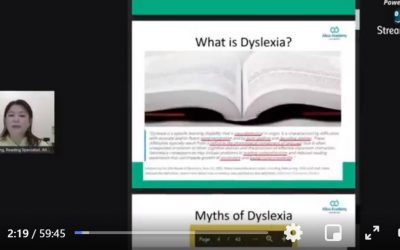Upcoming Events
Upcoming Talks
Dyslexia and Reading Intervention
Free Phonics Check!
Find out if your child possesses the skills to decode at his/her age-appropriate level. This Phonics Check is suitable for children 5 to 8 years old and it will only take 30 minutes! Fill out this form to make an appointment with us today.
Early Literacy for Babies and Tots
You may be wondering, "What is so difficult about teaching ABC and helping my child learn to read?" Well, these were what the parents that attended our workshop had to say: "What? I had no idea!""How come nobody told me this?""Ohhhh....""I just buy (learning...
Blog
Free Webinar: Dyslexia and Reading Intervention
If you missed this webinar earlier, click here to watch the video: Free Webinar: Dyslexia and Reading Intervention FREE WEBINAR Topic: Dyslexia and Reading Intervention Date: 16 October 2020, Friday Time: 8 - 9pm Join Dr Choy Su-Ling, Malaysia's first...
CityPlusFM Interview: Dyslexia Awareness Month
Listen to the podcast here: CityPlusFM 读写障碍(Dyslexia),也称为读写困难,是一种最常见的特殊学习困难。每一年的十月,是国际读写障碍醒觉日,但你本身对读写障碍的人士有多深呢?...
Learning Difficulties: Speaking to Parents in Denial
Now that we got your attention…I want to address the issue of denial. I understand that this is a sensitive topic but nonetheless, needs to be addressed. Very often I’ve come across well-meaning friends and relatives who notice that something is amiss but have...
In The News
CityPlus FM: Dyslexia Awareness Month 2020 Interview
Listen to the podcast here: CityPlus FM 读写障碍(Dyslexia),也称为读写困难,是一种最常见的特殊学习困难。每一年的十月,是国际读写障碍醒觉日,但你本身对读写障碍的人士有多深呢?...
Dyslexia and Reading Intervention Free Webinar
If you missed this webinar last month, click on this link to watch it again! FREE WEBINAR Topic: Dyslexia and Reading Intervention Date: 16 October 2020, Friday Time: 8 - 9pm Join Dr Choy Su-Ling, Malaysia's first AOGPE certified reading specialist this Friday. She...
Parent’s Resources
How long does instruction need to continue? How often? What progress can I expect?
How long a student will need specialized instruction depends on the severity of the problem and the frequency and length of the sessions. The International Dyslexia Association recommends at a minimum, one-hour sessions should occur two times per week; optimally, four or even five sessions should be scheduled per week—for up to two hours. Instruction should continue until the student is functioning at a level of independence that commensurate with age and cognitive ability. This could take two to three years or more. To master skills and apply them independently, students with a language-based learning disability, including dyslexia, need explicit instruction and consistent practice and repetition with teacher guidance—not only with development of skills but with application of these skills at higher and higher levels of functional use.
Teaching reading and other written language skills to students with dyslexia and related disorders is not a quick fix. It is hard work, and sometimes students complain about how difficult it is. At the same time, however, the students themselves are the best judges of the effectiveness of the program. Students quickly become aware that the systematic strategies they are learning allow them to identify or spell words they could not previously read or spell. They recognize their newly-learned ability to “figure out” what they could only guess previously. Although progress is often slow at the beginning, it will give them hope and motivate them to do their best and to keep trying. Significant progress becomes evident when appropriate instruction is delivered with fidelity, meaning with close adherence to the instructional guidelines of a particular Structured Literacy program, and when the instruction occurs with the necessary intensity (length and frequency of sessions; individual and small group instruction) and duration (how long instruction occurs over the months and years to come). Appropriate instruction for students with dyslexia and related language disorders is a process, not a product. For the student with dyslexia, it can be an important initial step toward a lifetime of learning.
Source: https://dyslexiaida.org/evaluating-professionals-fact-sheet/
Effective reading instruction
The most difficult problem for students with dyslexia is learning to read. Multisensory approaches are insufficient for effective instruction especially for students with dyslexia because they do not focus on the decoding skills these students need to succeed in reading. What does work is Structured Literacy, which prepares students to decode words in an explicit and systematic manner. This approach not only helps students with dyslexia, but there is substantial evidence that it is more effective for all readers.
Read more: https://dyslexiaida.org/effective-reading-instruction/
When educational promises are too good to be true
When a child struggles to read, parents and educators want to do everything possible to help that child keep up with his or her peers and be successful in school. But as much as we want that to happen overnight, that is not how it usually works. It can take years of hard work, even with the best teachers and instruction. These factsheets by IDA and Macquarie University provides guidance in learning to critically evaluate programs, and move forward toward providing instruction that will truly help the children who need it.
Read more:






